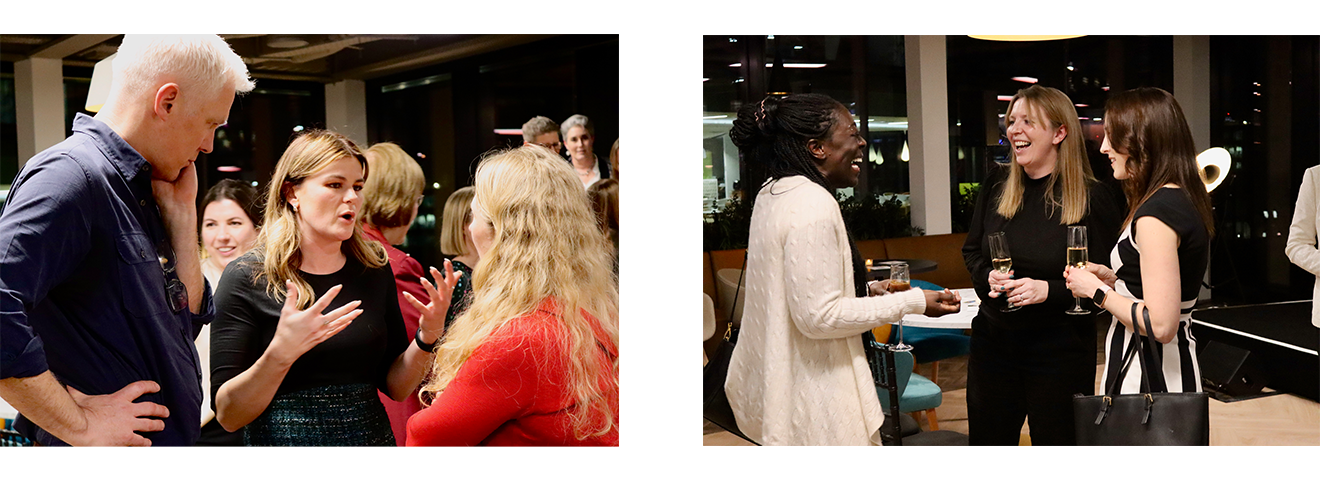Tanto a orientação quanto a auto-defesa necessárias para melhorar a inclusão, por exemplo, líderes femininas
Líderes seniores falou em nosso Dia Internacional do Dia das Mulheres@Berkeley Painel de rede Discussão do painel de inclusão.
Fostering inclusion requires focusing on both mentorship and greater self-advocacy, according to a panel of senior female leaders.
The insights were made at a panel discussion, convened by the Women@Berkeley Network as part of its International Women’s Day event programme, marking the 2024 theme of ‘inspiring inclusion’.
The panel line-up featured Claire Dickson, Chief Information Officer at DS Smith; Juanita Draude, Chief Growth Officer at Publicis Groupe; Carmen Janse van Rensburg, Head of Strategic Programmes at Anglo American; Caroline Hurndall, Director of Geopolitics at the Foreign, Commonwealth and Development Office (FCDO); and Melanie Stocker, Vice President of IT - Product and Supply Chain at Burberry.
Navigating male-dominated environments
With such diverse industries represented on the panel, from sustainable packaging to mining to luxury fashion, the speakers had taken very different career paths. Still, their discussion raised various common challenges as women in their respective fields.
Most of the panellists have had to navigate male-dominated workplaces. Carmen began her mining sector career as a Big Four auditor before moving to an industry role.
“I was the first female auditor on a mine site. I had to eat in a separate dining room because they didn't have space for me. I had to sleep somewhere separately,” she said.
Caroline, who first joined the then Foreign Office upon leaving university, experienced similar dynamics over the course of her career.
“I was probably one of two women on a command team of 50,” she said of her time in Helmand Province in Afghanistan, where she worked with the US Marines.
She later became the first female British ambassador to Libya, which she credits partially to intentional efforts from Foreign Office senior leaders to promote more women to ambassador roles.
Even Melanie, when asked about working in the fashion industry, which is commonly perceived to be female-friendly, described issues with gender imbalance.
“[Moda] parece um mundo dominado por mulheres. Mas você precisa olhar para onde eles estão e é aí que está o desafio. Quanto mais você vai, quanto mais fino o ar fica e menos mulheres não pensam. Se você pensa no espaço de luxo, o mesmo é o mesmo. Diferente. Apenas dando a eles essa oportunidade - porque é por isso que estou aqui hoje. I can't overemphasise the importance of having that someone in your career: a mentor or even just a peer or a colleague that understands what you're going through.”
The importance of mentorship and role-modelling for promoting inclusion
All the panellists emphasised the importance of having mentors and allies who supported, challenged and encouraged them to pursue their goals.
You cannot underestimate the power of just giving one person a chance, whether it’s through a mentoring programme, having a conversation or just giving them that opportunity – because that's why I'm here today. I can't overemphasise the importance of having that someone in your career: a mentor or even just a peer or a colleague that understands what you're going through.”
Carmen janse van rensberg, Anglo american
The speakers also shared how they themselves have in turn tried to mentor and support other women and create a culture of inclusion and allyship in their own Organizações. E isso está realmente preso comigo. É o que estou procurando na minha equipe, em mim, na liderança e nas pessoas para as quais trabalho. Eu assumo meu papel como modelo ou mentor muito, muito seriamente. ”
Melanie said, “I had a couple of brilliant role models at Burberry, who listened and invested their time. And that's really stuck with me. It’s what I'm looking for in my team, in myself, in leadership and the people I work for. I take my role as a role model or mentor very, very seriously.”
Referindo -se ao seu tempo no Afeganistão como consultora política, trabalhando em conjunto com sua contraparte dos EUA, Caroline discutiu uma experiência semelhante.“ Não estávamos na cadeia militar de comando, por isso éramos gratuitos para oferecer desafios e livres para dizer o que pensamos. O general se voltaria para nós e dizia: ‘O que você acha? Eu me importo com o que você pensa. 'Isso significava que todos os outros ao redor da mesa também tinham que se importar. Eu realmente trouxe isso comigo-se você estiver presidindo a reunião, é importante convidar as pessoas a falarem, que podem não sentir que necessariamente têm o direito ou estão um pouco assustadas. ”
Conselhos para as aspirantes a mulheres líderes
The panellists discussed how their confidence has grown as they advanced in their careers and reflected on the importance of encouraging women to better self-advocate.
Prior to taking maternity leave for her second child, Claire was working at BP and aiming for the role of CIO. She worried the job would become vacant while she was on leave. “I actually had some quite difficult conversations. I went and saw the current CIO and various people in the business and I said to them, ‘Look, just because I'm going on maternity leave, I don't want you to think that I don't want that job. I would really love that job.’”
Três meses em sua licença de maternidade, ela recebeu um telefonema do CFO para convidá -la a entrevistar o trabalho. Ela se tornou a primeira mulher a manter o papel na BP. Muitas vezes, as pessoas assumem coisas sobre você. ‘Oh, você está tendo um bebê. Você deve querer ter uma etapa lateral em sua carreira. 'As pessoas precisam ouvir de você sobre o que você gostaria. Se você quiser tomar uma etapa lateral, diga a eles que deseja tomar um passo lateral. Se você quiser ser considerado para um papel, coloque -se lá fora e diga: 'Eu só quero que você saiba que isso é algo que estou realmente interessado em fazer por esses motivos e gostaria de colocar meu chapéu no ringue. Eu gostaria de ser considerado. '”
Claire added, “The lesson there is: don’t assume that people know what your ambitions are. A lot of times, people assume things about you. ‘Oh, you're having a baby. You must want to have a side-step in your career.’ People need to hear from you on what you would like. If you want to take a side-step, tell them you want to take a side-step. If you want to be considered for a role, put yourself out there and say, ‘I just want to let you know that this is something I'm really interested in doing for these reasons, and I'd like to put my hat in the ring. I'd like to be considered.’”
Juanita aconselhou as mulheres a não ter medo de correr riscos em suas carreiras.
It's a job. Nothing's irreversible. You can choose to do something else. And choose to take that risk. Because is it a risk or is it just something new and different that you'll never regret because at least you've tried it? At the end of the day, the choice is yours.”
Juanita Draude, Publicis Groupe
Melanie compartilhou comentários semelhantes. “Você precisa encontrar um ambiente em que possa prosperar, mas também precisa perseguir oportunidades. Se você vê uma, vá em frente. Tenha a coragem de fazê -lo. É um desafio geralmente com as mulheres. Portanto, é algo que você precisa aprender.”
A inclusão é essencial para um melhor desempenho nos negócios
Embora a inclusão seja sem dúvida que vale a pena lutar de uma perspectiva ética, a discussão também destacou como isso leva a melhores resultados de negócios e organizações.
Caroline reflected on advice she received from Dame Margaret Anstee, the first female head of a peacekeeping mission for the UN.
ela disse, não tenha medo de usar o fato de que você é uma mulher. Ela quis dizer que você é diferente da maioria das pessoas que trabalham nessa esfera, que era muito dominado por homens. E tudo bem, porque você está trazendo algo diferente para a mesa e isso pode realmente estar em sua vantagem. Eu acho que essa foi a minha primeira experiência de que a diversidade e a inclusão não são apenas importantes por si só. Isso realmente ajuda a trazer desafio e diferença. ”
Caroline Hurndall, Estrangeiro, Commonwealth & Development Office
Juanita falou sobre como a diversidade e a inclusão leva a uma melhor colaboração e um trabalho mais criativo e eficaz, principalmente em uma organização de matriz. Nenhuma pessoa é a mesma, e essa é a coisa mais brilhante em trabalhar com muitas pessoas diferentes ”, disse ela. É mais importante do que nunca que temos diversidade, porque é assim que chegamos a uma boa ética e tomada de decisão. Treinar esses modelos deve estar com uma gama diversificada de mentes. Precisa ser um espaço seguro e inclusivo. É realmente importante para decidir onde aplicaremos essa tecnologia. Precisamos pensar no que estamos fazendo e por que estamos fazendo isso - e isso não deve ser o pensamento de grupo. ”
Discussing the implications for the technology sector, and particularly for advances in artificial intelligence, Claire said, “We are in a world of AI where we are training models to think and make decisions on our behalf. It is more important than ever that we have diversity because that's how we get to good ethics and decision-making. Training those models has to be with a diverse range of minds. It needs to be a safe and inclusive space. It is really important for deciding where we're going to apply this technology. We need to think through what we're doing, and why we're doing it – and that shouldn't be groupthink.”
The Women@Berkeley Network
Assistido por mais de 100 mulheres de uma ampla variedade de organizações, o evento foi hospedado por Berkeley e SIMELELE@Berkeley. Moderado pelo consultorSameera Simjee, while the discussion was moderated by consultant Katy Spencer. Nosso local de trabalho é agora 50:50 mulheres para homens. Atuamos um programa de desenvolvimento de liderança feminina na London Business School e Harvard nos EUA, recebemos duas coortes em nosso programa de mentoria feminina e lançamos nossa política de menopausa em outubro passado. Ainda há muito o que fazer, mas somos ferramentas e, mais importante, estamos prontos para elevar nossa rede e nossa ambição ainda mais. Obrigado às nossas incríveis clientes mulheres, amigos de Berkeley e nossos painelistas fantásticos por se juntarem a nós e compartilharem suas histórias. ”
Sameera said, “Wanting to grow our cohort of amazing women, we established Women@Berkeley to foster this talent. Our workplace is now 50:50 women to men. We've put in place a Women's Leadership Development programme with London Business School and Harvard in the US, welcomed two cohorts into our Women's Mentoring Programme, and launched our menopause policy last October. There's still much to do, but we're tooled up and more importantly, we are up for elevating our Network and our ambition even further.
It’s been my absolute pleasure to open our Network to external guests through this event. Thank you to our amazing women clients, friends of Berkeley, and our fantastic panellists for joining us and sharing their stories.”
Sameera Simjee, a parceria de Berkeley











